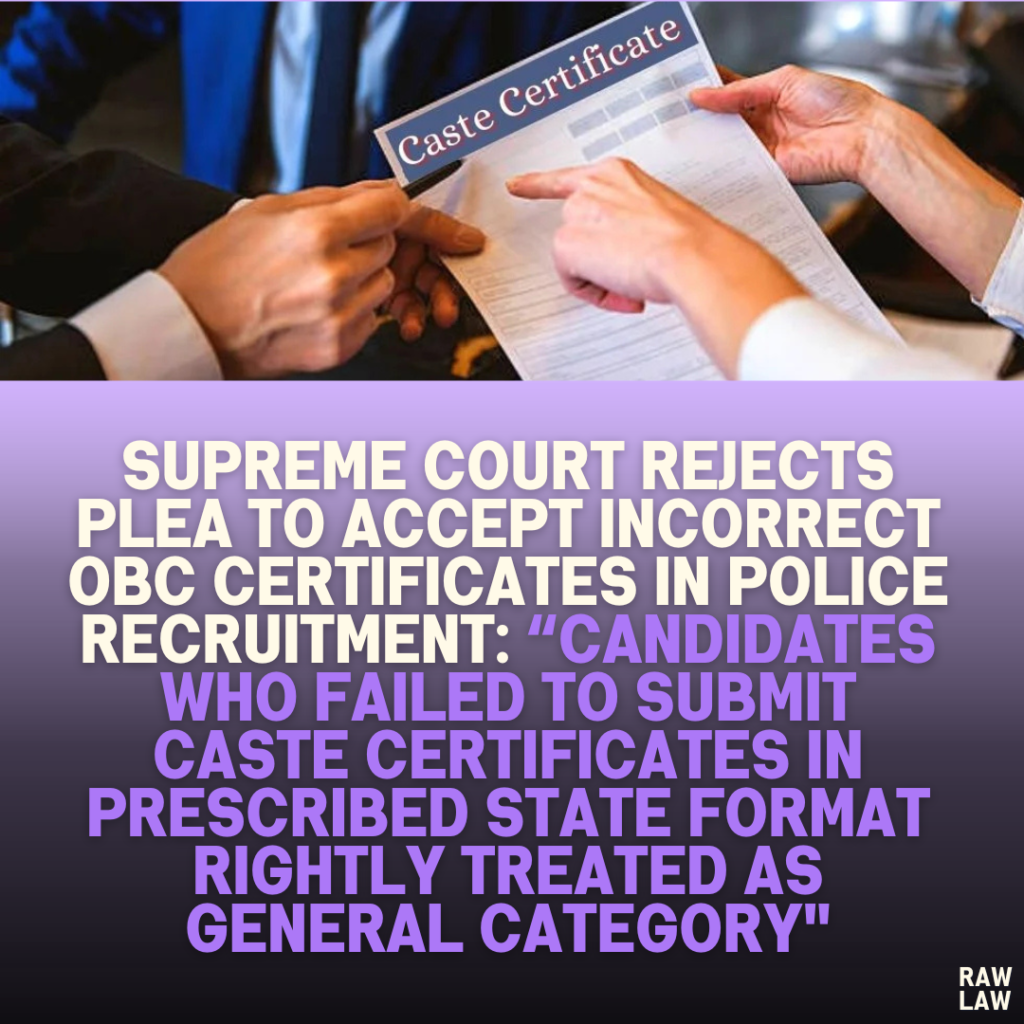Court’s Decision
The Supreme Court dismissed the appeal filed by a candidate challenging his exclusion from the OBC category list in the UP Police Sub-Inspector recruitment process due to submission of a caste certificate in the wrong format. Simultaneously, it allowed the State’s appeal challenging a High Court order that had directed acceptance of a similar incorrect OBC certificate. The Court held:
“Once a process of recruitment is set in motion, all aspirants are entitled in law to equal treatment. There cannot be different yardsticks for different sets of aspirants.”
It concluded that both candidates, having failed to submit OBC certificates in the prescribed State Government format, were rightly treated as general category candidates and denied reservation benefits.
Facts
In Civil Appeal No. 5233/2025, the appellant had applied for recruitment to the post of Sub-Inspector and Platoon Commander under the UPPRPB’s 2020–2021 recruitment notification. He scored 313.84 marks—above the OBC cut-off (305.542) but below the general category cut-off (316.11). His representation was rejected as he had submitted an OBC certificate meant for Central Government jobs rather than the format prescribed for State Government recruitment.
In Civil Appeal No. 5234/2025, the respondent had also applied for the same recruitment, scored 287 (above OBC cut-off), but was similarly denied selection for submitting a non-compliant OBC certificate. While the High Court had directed UPPRPB to accept her certificate, the Supreme Court reversed this direction.
Issues
Whether UPPRPB was bound to accept OBC certificates not submitted in the prescribed State Government format (Format-I) as per Clause 5.4(4) of the Recruitment Notification.
Petitioner’s Arguments
- The candidates belong to OBC communities and submitted valid caste certificates issued by competent authorities (Tehsildars).
- The failure to submit the certificate in the specified format should not invalidate their candidature.
- They cited precedents such as:
- Dolly Chhanda v. Chairman, JEE: Not every infraction of rules warrants disqualification.
- Ram Kumar Gijroya and Karn Singh Yadav: Technicalities should not defeat the purpose of reservation policies.
- They urged that merit should not be overlooked due to a procedural lapse.
Respondent’s Arguments (State of U.P. and UPPRPB)
- The recruitment was governed by the 2015 Rules and 1994 Reservation Act.
- Clause 5.4(4) explicitly stated that failure to submit OBC certificate in Format-I (State-specific) would lead to treatment as unreserved category.
- The certificates submitted by the appellants were for Central Government jobs, lacking the financial and asset criteria mandated by the State G.O. dated 17 December 2014.
- Verification of creamy layer criteria would become impractical if candidates were allowed to submit alternate formats.
- The principle laid down in Bedanga Talukdar v. Saifudaullah Khan applied: rules must be followed if no relaxation is provided.
Analysis of the Law
The Court reiterated that procedural conditions set forth in recruitment notifications are mandatory unless violative of Articles 14 or 16. It emphasized uniform application of rules and cautioned against selective relaxation for individual candidates, stating:
“Non-compliance with the terms of the advertisement/notification is bound to trigger adverse consequences.”
Precedent Analysis
- Registrar General, Calcutta High Court v. Shrinivas Prasad Shah: Reiterated that a candidate must submit a certificate issued by the competent authority in the prescribed form, or risk being treated as a general category candidate.
- Meeta Sahai v. State of Bihar: A candidate may challenge illegality in procedure if such breach is not foreseeable. However, in the present case, the requirement was unambiguous.
The Court refused to treat prior High Court decisions (granting relief to similarly placed candidates) as precedents, stating:
“Special leave petitions were dismissed at the admission stage and, therefore, do not operate as binding precedents.”
Court’s Reasoning
- The requirement of Format-I was “far from ambiguous”.
- Candidates did not seek clarification or obtain the correct format in time, nor was it shown that obtaining the proper certificate was legally barred.
- Accepting alternate formats would place undue burden on recruiting authorities and undermine uniformity.
“The recruiting authority is the best judge of what its requirements are… the courts should lean in favour of the recruiting authority.”
Conclusion
The Court dismissed the appeal of the candidate who was denied relief by the High Court and allowed the State’s appeal against the High Court’s direction to accept the incorrect OBC certificate. It ruled that:
“Insistence on the part of UPPRPB of certificates issued in the requisite format is not a mere formality but a necessary requirement.”
Implications
This judgment strengthens the authority of recruitment agencies to prescribe and enforce document formats during selection processes. It sets a clear precedent that failure to comply with technical but mandatory requirements—even if the candidate otherwise belongs to the reserved category—will result in denial of benefits. Aspirants must strictly adhere to all stipulations in recruitment notifications to avoid disqualification.
